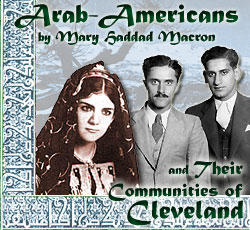I posted a chapter @ PRESENT LEBANESE PROBLEMS ("What's the difference between Syrian and Lebanese?")
Those who had been known for decades in America as Syrians now had new options. While many of the early immigrants had come to America from Damascus, Aleppo and those cities of Greater Syria which remained unchanged in the political divisions, most of the Arab-Americans in Cleveland and neighboring Ohio cities found their ancestral ties within the newly declared country of Lebanon. To these people, the home cities and villages of which they had often spoken with warm remembrance and longing, those towns of Aramoon, Kuba, Khirbet, Zahleh, Aiteneet, Saghbein, Mazraha and Ma'asghura, were no longer in Syria, but in the new country, Lebanon. Therefore, they would now be called Lebanese, thus confusing their less-informed fellow Americans even more than themselves.
"What's the difference between Syrian and Lebanese?" their neighbor would ask.
"Well, you see, there's this new country now, and they have been fighting for independence for a long time."
"From the Syrians?"
"Well no, from the Turks, and then from the French -- from the Mandate."
"Well, if you were Syrian before, and you spoke Arabic, what do you call your language now, Lebanese?"
"No, you see, there is no Lebanese language; we all have Arabic as a common language. All over the Middle East, and in North Africa, the language of the Arab countries is Arabic."
Then would come the questions about language, history, nationality, who is Arab and who is not, what is Phoenician and why -- questions which continue under discussion today, the answers based on personal preference, emotion or bias, and not always on fact.
It would be difficult to understand the basis for the attitudes and political sympathies of most Lebanese Americans if we did not first glance at the complexities of the long, tragic history of the Lebanese struggle for independence. Since most of their forebears came to America during the period of occupation of the mother country by the Turkish Empire, the first generations were raised in that deliberately divisive social environment established by the Turks, the previously mentioned millet.
